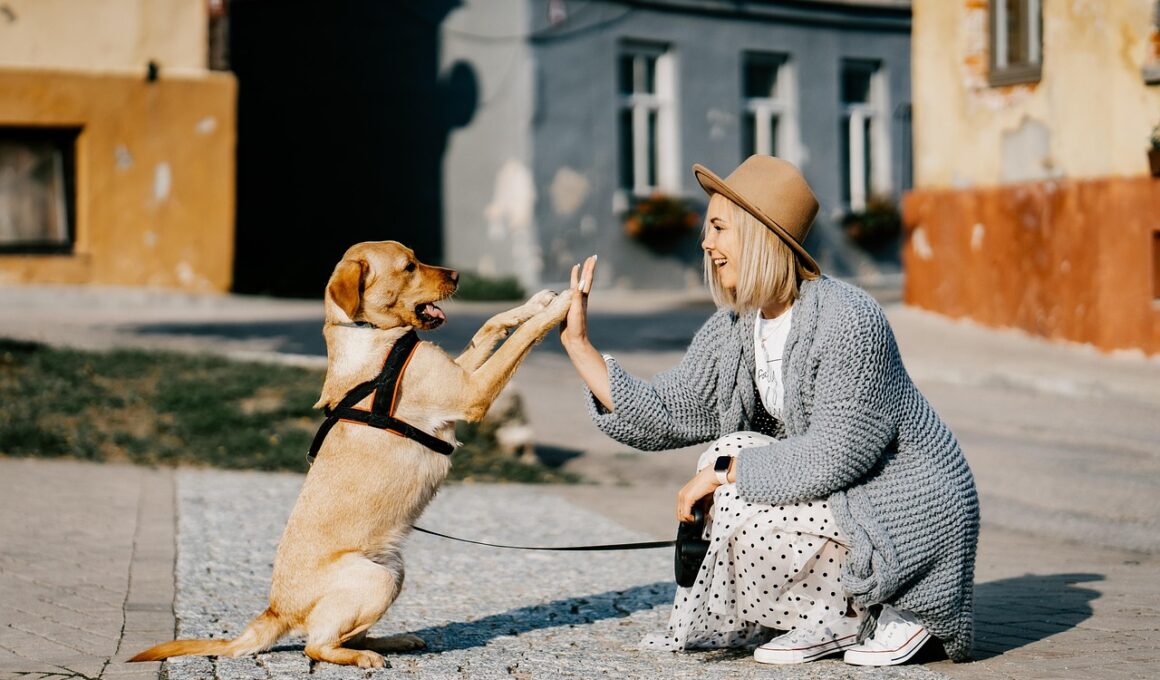Using Playdates to Socialize Your Adopted Dog
When you welcome a new dog into your home, socialization is crucial. It helps them grow accustomed to their surroundings, promotes good behavior, and fosters a strong bond between you and your pet. One effective method to ensure your dog becomes well-adjusted is through playdates. By scheduling regular playdates with other friendly and vaccinated dogs, you create valuable opportunities for your adopted dog to interact positively with others. These interactions are not just fun; they are essential for teaching your dog how to communicate effectively with fellow canines and humans. During these encounters, you can observe your dog’s behavior in different situations, help address any issues like fear or aggression, and encourage play. The use of playdates makes it easier for your dog to learn valuable social skills in a low-pressure environment. Furthermore, it is a lot of fun to see your dog enjoy themselves while developing friendships. By consistently arranging playdates, your pet will enjoy social time, ensuring they grow up to be a well-behaved and friendly dog, ready to face the world confidently.
To maximize the benefits of playdates, consider carefully choosing your canine companions. Look for dogs that are social and have compatible energy levels with your adopted dog. Smaller dogs may not be the best match if your dog is larger and more boisterous, as this can intimidate smaller dogs. Conversely, if your dog is timid, pairing them with a gentle and calm playmate may encourage confidence. Observing the initial interactions can also help gauge the fit of the playdate. Invest time in introducing the dogs in a safe, neutral location to avoid territorial behaviors and promote a positive experience. Effective communication between you and the other dog owner is essential for ensuring the playdate environment is positive for both pets. Before the playdate, discuss any specific needs or concerns regarding each dog to facilitate a comfortable interaction. Keep a close eye on their behavior during the playdate, stepping in if necessary to encourage positive behavior or to take a break if things become too chaotic. Reinforcing positive interactions with praise and treats during play will further enhance their social skills.
Utilizing structured activities during playdates can enhance socialization success for your adopted dog. Games like fetch or tug-of-war can act as great icebreakers, drawing the dogs together in a playful manner. Structured games help ensure that both dogs have a focus during their playtime, decreasing the likelihood of overly rambunctious behavior or negative interactions. If possible, introduce newer toys or objects to encourage interaction, allowing the dogs to explore together. You may also want to rotate toys when scheduling playdates. This process creates stimulating experiences that keep the play engaging. Allowing your dog to engage in these activities leads to better social skills, confidence, and trust in other dogs. Remember to mix up the participants from time to time to help your dog adjust to various canine personalities. Varying the dog companions can expose your adopted dog to different play styles and enhance their overall adaptability. With time, playdates can evolve into more dynamic interactions, setting the groundwork for them to thrive socially in varying situations.
Understanding Dog Body Language
Understanding your dog’s body language during playdates is essential for ensuring a safe environment. Being familiar with what is normal for your dog helps identify when they are enjoying themselves versus when they may be feeling stressed. Look for signs of play such as wagging tails, play bows, and loose body movements. These signals indicate that your dog feels comfortable and playful. However, watch for signs of discomfort too—like raised hackles, a tucked tail, or lip licking. These behaviors may signal anxiety or readiness to get away from a situation. Awareness of such signals allows you to step in before situations escalate. If one dog becomes overly aggressive or persistent, it can lead to negative experiences for both pets. Avoid punishing your dog for instinctive reactions; correct behavior with positive reinforcement instead. Redirect your dog’s focus toward a toy or call them away momentarily. This understanding of body cues will help make playdates more enjoyable while building a harmonious relationship between your pet and their new friends.
Consistency is key during the playdate process, as frequent interactions will foster reliable social skills in your adopted dog. Aim for weekly playdates, but be flexible with frequency based on your dog’s comfort and needs. Some dogs will thrive with more frequent visits, while others may prefer longer gaps in between to recharge. Each playdate should involve light-hearted fun yet maintain a relaxed atmosphere. This environment will encourage your dog to explore their surroundings without fear. Dogs learn through their experiences, so don’t hesitate to adjust playdates based on your dog’s growing comfort and social abilities. Create positive routines and associations with other dogs. Allowing your dog to dictate the play’s pace can help them become more adaptable and less anxious. Likewise, pair new experiences and challenges with positive reinforcements; this promotes attachment. Offer treats or praise for positive behavior during social interactions, reinforcing confidence in their social skills. By building a routine, you’ll not only enhance the social experience but also encourage a confident and adaptable dog.
The Role of Owners in Playdates
As an owner, your active participation during playdates is vital in guiding your dog’s socialization. Monitoring their interactions along with clear communication sets a positive tone for your dog. Your leadership role helps to manage any unexpected behavior by stepping in gently and redirecting energy when necessary. Being vigilant during playtime allows you to recognize potential triggers for anxious behavior or overly dominant actions quickly. Others may not be attuned to your dog’s unique comfort zones, so lovingly advocating for your dog during these moments is essential. Remaining relaxed and confident will help your dog feel more assured in challenging scenarios. It encourages them to explore socializing without trepidation. Be proactive in discussing play etiquette before the meeting, helping everyone understand how to ensure a safe environment. Regularly reviewing your dog’s skills with others can provide valuable feedback. Such exchanges can enhance the playdate experience for both dogs and owners alike. Together, as a cohesive unit, you can facilitate learning through consistent practice, creating a healthy social environment while nurturing the bond between you and your newly adopted dog.
Remember that socializing your adopted dog through playdates is a gradual process requiring patience and dedication. Every dog possesses a unique personality that influences how they interact with others. Some dogs may take longer to adapt, while others might be more outgoing from the start. If your dog is struggling, don’t hesitate to consult with a professional dog trainer or behaviorist. They can provide tailored strategies that help facilitate successful social interactions, taking your dog’s individual needs into account. Creating a balanced social experience encourages your dog to thrive in social settings, allowing them to explore their potential. Additionally, forming bonds with other pet owners can be equally rewarding for you. Engaging in conversations with fellow dog owners provides support, tips, and encouragement as you navigate the socialization journey. Playdates can foster community among dog lovers, helping create a supportive network. As you and your dog progress together, embrace the journey of growth filled with joy, connection, and new friendships while creating lasting memories. It is a beautiful experience that enriches both your lives and strengthens your bond.






